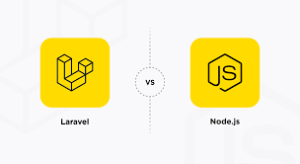Introduction
Choosing the right technology stack is a critical decision when developing web applications. Two popular options for building web applications are Laravel and Node.js. Laravel is a PHP-based web framework, while Node.js is a JavaScript runtime that allows for server-side scripting. In this blog, we’ll compare Laravel and Node.js, exploring their strengths and use cases to help you decide which one is the best fit for your project.
Understanding Laravel
Laravel is a widely adopted PHP framework known for its elegant syntax, robust features, and developer-friendly tools. It follows the Model-View-Controller (MVC) architectural pattern and provides a rich set of libraries and functionalities for building web applications.
Understanding Node.js
Node.js, on the other hand, is not a framework but a runtime environment for executing JavaScript on the server-side. It uses an event-driven, non-blocking I/O model, making it efficient for building real-time applications and APIs. Node.js is often used in conjunction with frameworks like Express.js to simplify web application development.
When to Choose Laravel
- Rapid Development: Laravel is an excellent choice for projects that require rapid development. Its elegant syntax and built-in features, such as authentication, routing, and ORM (Eloquent), accelerate development and reduce the need for writing repetitive code.
- Large and Complex Applications: Laravel shines when building large and complex applications. It offers powerful tools for managing application architecture and structuring code, which is crucial for maintaining a large codebase.
- Enterprise Applications: For enterprise-level applications that require scalability, robust security features, and integration with third-party services, Laravel provides the necessary foundation. Its extensive ecosystem of packages and libraries simplifies complex tasks.
- Content Management Systems (CMS): If you’re developing a CMS or a content-focused website, Laravel’s capabilities for managing content, relationships, and user permissions make it a suitable choice.
- Community and Ecosystem: Laravel boasts a vibrant community and a vast ecosystem of packages and extensions. This ensures that you’ll find solutions to common problems and enjoy ongoing support for your project.
- Built-in Tools: Laravel comes with various built-in tools like Artisan, which automates tasks like database migrations and seeding. This enhances developer productivity and streamlines repetitive tasks.
- Authentication and Authorization: Laravel provides a robust authentication and authorization system, making it ideal for applications that require user registration, roles, and permissions.
- ORM (Eloquent): Eloquent, Laravel’s ORM, simplifies database interactions by allowing developers to work with databases using object-oriented syntax. This is particularly beneficial when working with complex database structures.
When to Choose Node.js
- Real-time Applications: Node.js is the preferred choice for real-time applications that require instant updates and low-latency communication. Examples include chat applications, online gaming, and live streaming platforms.
- API Development: If your project primarily involves creating RESTful APIs or GraphQL endpoints, Node.js, often with Express.js, is an excellent choice. Its asynchronous, non-blocking nature makes it efficient for handling a large number of simultaneous API requests.
- Microservices Architecture: Node.js is well-suited for building microservices due to its lightweight, modular nature. It allows for easy development and deployment of individual services that communicate with one another.
- Single-Page Applications (SPAs): For SPAs that heavily rely on JavaScript, Node.js can serve as the backend, providing APIs and handling client-side routing. This creates a seamless integration between the frontend and backend.
- Cross-Platform Desktop Applications: Using frameworks like Electron, you can build cross-platform desktop applications with Node.js. This allows you to leverage your web development skills for creating desktop software.
- Developer Expertise: If your development team is already proficient in JavaScript, leveraging Node.js can streamline the development process, as developers can work on both the frontend and backend using the same language.
- Scalability: Node.js’ event-driven architecture makes it well-suited for handling a large number of concurrent connections, making it a great choice for applications that require high scalability.
Factors to Consider
While the choice between Laravel and Node.js depends on your project’s specific requirements, there are some general factors to consider:
- Development Team: Consider the expertise of your development team. If they are more comfortable with PHP, Laravel may be the better choice. If they have a strong background in JavaScript, Node.js could be a natural fit.
- Project Complexity: Assess the complexity of your project. Laravel is well-suited for projects with intricate business logic and database interactions, while Node.js excels in real-time and API-driven applications.
- Ecosystem and Libraries: Explore the libraries and packages available for each technology. Laravel has a rich ecosystem for web development, while Node.js offers extensive libraries for different use cases.
- Performance: Consider the performance requirements of your application. Node.js’ non-blocking I/O can handle a high volume of concurrent requests efficiently, making it suitable for applications with high performance demands.
- Community and Support: Evaluate the community support and available resources for troubleshooting and learning. Both Laravel and Node.js have active communities, but the level of support may vary for specific use cases.
- Scalability: If scalability is a key concern, Node.js may be preferable due to its asynchronous architecture. Laravel can also scale effectively but may require additional considerations.
Conclusion
In the Laravel vs. Node.js debate, there is no one-size-fits-all answer. Both technologies have their strengths and are suitable for different types of web applications. The choice ultimately depends on your project’s requirements, your development team’s expertise, and your long-term goals.
Laravel is an excellent choice for building feature-rich, enterprise-level applications, content management systems, and projects where rapid development is essential. Node.js excels in real-time applications, API development, microservices, and scenarios where low latency and high concurrency are crucial.
By carefully evaluating your project’s needs and aligning them with the strengths of Laravel and Node.js, you can make an informed decision that sets your web development endeavor up for success.